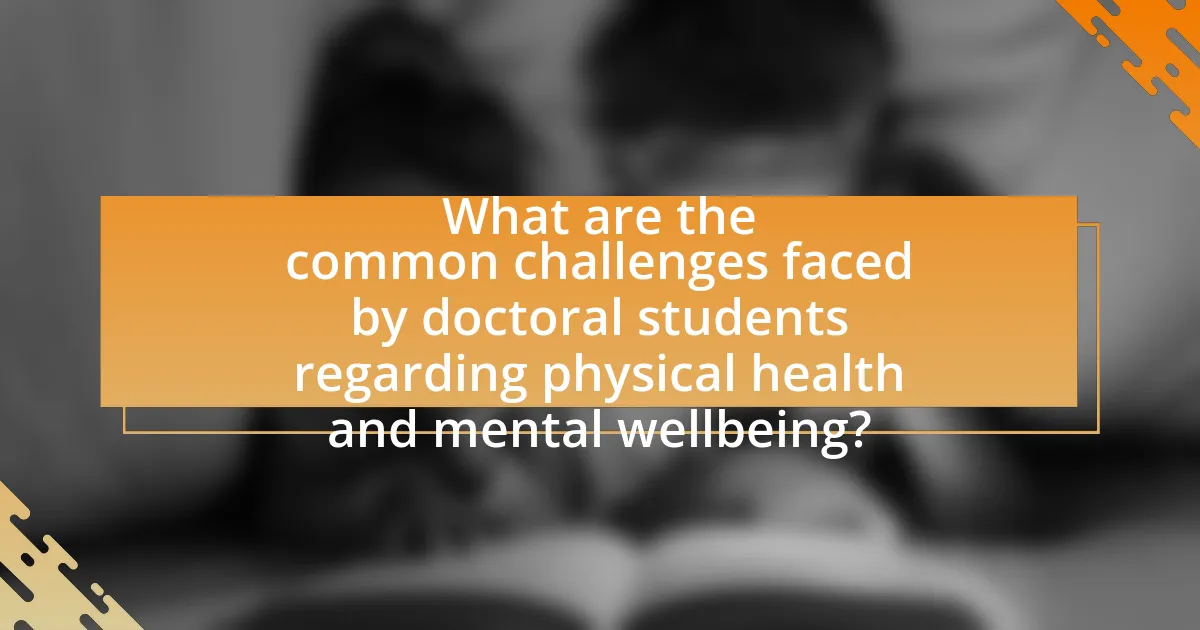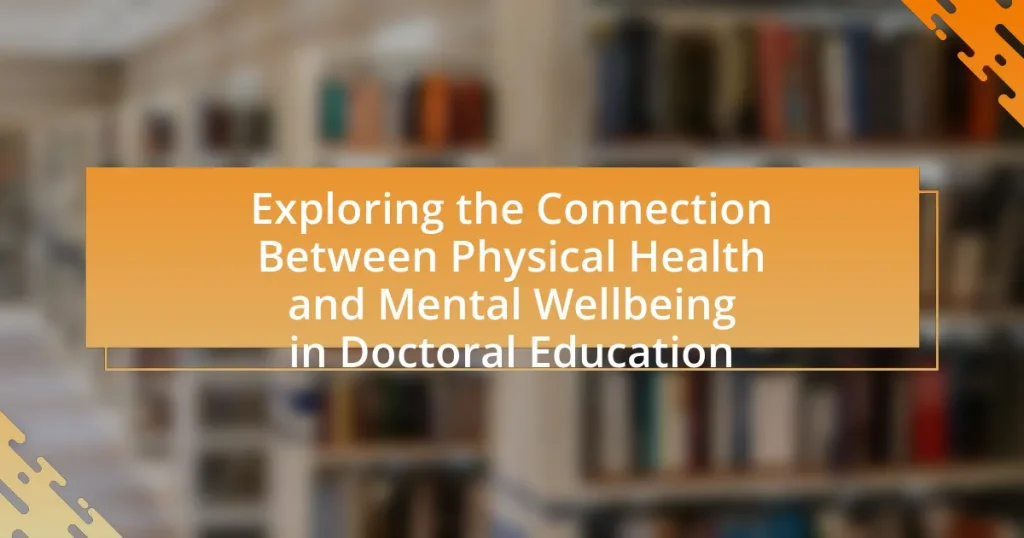The article explores the critical connection between physical health and mental wellbeing in doctoral education, highlighting how poor physical health can exacerbate stress, anxiety, and depression among students. It discusses the reciprocal relationship between these two aspects, emphasizing that regular physical activity, balanced nutrition, and adequate sleep are essential for enhancing mental resilience and academic performance. The article also addresses common challenges faced by doctoral students, such as high stress levels and social isolation, and outlines effective strategies and institutional support systems that can promote holistic health management and improve overall wellbeing in this demanding academic environment.

What is the connection between physical health and mental wellbeing in doctoral education?
Physical health significantly influences mental wellbeing in doctoral education, as poor physical health can lead to increased stress, anxiety, and depression among students. Research indicates that students who engage in regular physical activity report higher levels of mental resilience and lower levels of psychological distress. For instance, a study published in the Journal of American College Health found that physical exercise is associated with improved mood and cognitive function, which are critical for the demanding nature of doctoral studies. Additionally, maintaining a balanced diet and adequate sleep contributes to better concentration and emotional stability, further enhancing academic performance and overall wellbeing.
How do physical health and mental wellbeing influence each other in this context?
Physical health and mental wellbeing significantly influence each other in the context of doctoral education. Research indicates that poor physical health can lead to increased stress, anxiety, and depression among doctoral students, which in turn negatively impacts their academic performance and overall mental wellbeing. Conversely, strong mental wellbeing can enhance physical health by promoting healthier lifestyle choices, such as regular exercise and balanced nutrition, which are crucial for sustaining the rigorous demands of doctoral studies. A study published in the Journal of American College Health found that students with higher levels of physical activity reported better mental health outcomes, demonstrating the reciprocal relationship between these two aspects of health.
What specific aspects of physical health impact mental wellbeing for doctoral students?
Physical health aspects such as sleep quality, nutrition, and physical activity significantly impact the mental wellbeing of doctoral students. Poor sleep quality can lead to cognitive impairments and increased stress levels, as evidenced by research indicating that sleep deprivation negatively affects mood and cognitive function (Walker, 2017). Additionally, inadequate nutrition can result in deficiencies that affect brain function and emotional regulation, with studies showing that a balanced diet is linked to improved mental health outcomes (Jacka et al., 2017). Regular physical activity has also been shown to reduce symptoms of anxiety and depression, promoting overall mental resilience (Craft & Perna, 2004). These interconnected factors highlight the importance of maintaining physical health to support mental wellbeing in the demanding environment of doctoral education.
How does mental wellbeing affect physical health outcomes in doctoral education?
Mental wellbeing significantly influences physical health outcomes in doctoral education by affecting stress levels, immune function, and overall health behaviors. Research indicates that high levels of stress and anxiety, common in doctoral programs, can lead to physical health issues such as cardiovascular problems and weakened immune responses. For instance, a study published in the Journal of American College Health found that students with poor mental health reported higher instances of physical ailments, including headaches and gastrointestinal issues. Additionally, individuals with better mental wellbeing are more likely to engage in healthy behaviors, such as regular exercise and balanced nutrition, which further enhances their physical health.
Why is understanding this connection important for doctoral students?
Understanding the connection between physical health and mental wellbeing is crucial for doctoral students because it directly impacts their academic performance and overall quality of life. Research indicates that poor physical health can lead to increased stress, anxiety, and depression, which are prevalent among doctoral students. For instance, a study published in the Journal of American College Health found that students with higher levels of physical activity reported better mental health outcomes. This highlights the importance of maintaining physical health to enhance mental resilience, thereby improving academic success and personal wellbeing during the demanding doctoral journey.
What are the potential consequences of neglecting physical health on mental wellbeing?
Neglecting physical health can lead to significant negative consequences on mental wellbeing, including increased anxiety, depression, and cognitive decline. Research indicates that poor physical health, characterized by lack of exercise, poor nutrition, and inadequate sleep, can exacerbate stress levels and diminish mood stability. For instance, a study published in the Journal of Clinical Psychiatry found that individuals with chronic health conditions are more likely to experience depressive symptoms, highlighting the direct link between physical ailments and mental health issues. Furthermore, the World Health Organization emphasizes that physical inactivity is a major risk factor for mental disorders, reinforcing the importance of maintaining physical health to support mental wellbeing.
How can improved mental wellbeing enhance academic performance in doctoral studies?
Improved mental wellbeing enhances academic performance in doctoral studies by increasing focus, motivation, and resilience. When doctoral students experience better mental health, they are more likely to engage deeply with their research, leading to higher quality work and greater productivity. Research indicates that mental wellbeing is linked to cognitive functions such as memory and problem-solving, which are crucial for academic success. For instance, a study published in the Journal of Educational Psychology found that students with higher levels of psychological wellbeing achieved better academic outcomes, demonstrating a clear correlation between mental health and academic performance.

What are the common challenges faced by doctoral students regarding physical health and mental wellbeing?
Doctoral students commonly face challenges related to physical health and mental wellbeing, including high levels of stress, lack of physical activity, and social isolation. Research indicates that 40% of doctoral students experience anxiety and depression, which can be exacerbated by the demands of their programs and the pressure to publish. Additionally, many students report neglecting their physical health due to time constraints, leading to poor nutrition and insufficient exercise. These factors contribute to a cycle of declining mental health, as physical wellbeing is closely linked to psychological resilience.
What specific stressors contribute to physical health issues among doctoral students?
Specific stressors that contribute to physical health issues among doctoral students include high academic pressure, financial strain, and lack of work-life balance. High academic pressure often leads to chronic stress, which can result in physical symptoms such as headaches and gastrointestinal issues. Financial strain is prevalent among doctoral students, with many facing debt and limited funding, which can exacerbate anxiety and lead to poor health choices. Additionally, the lack of work-life balance often results in insufficient sleep and poor nutrition, further impacting physical health. Research indicates that these stressors can lead to increased rates of anxiety and depression, which are closely linked to physical health problems in this population.
How do time management and workload affect physical health?
Time management and workload significantly impact physical health by influencing stress levels and lifestyle choices. Poor time management often leads to increased workload, which can result in chronic stress, sleep disturbances, and unhealthy coping mechanisms such as poor diet and lack of exercise. Research indicates that high stress levels are associated with various health issues, including cardiovascular diseases and weakened immune function. For instance, a study published in the Journal of Occupational Health Psychology found that individuals with poor time management skills reported higher levels of stress and related health problems. Thus, effective time management can mitigate workload stress and promote healthier lifestyle choices, ultimately benefiting physical health.
What role does social isolation play in mental wellbeing during doctoral education?
Social isolation negatively impacts mental wellbeing during doctoral education by increasing feelings of loneliness and stress. Research indicates that doctoral students often experience high levels of isolation due to the demanding nature of their studies, which can lead to anxiety and depression. A study published in the Journal of Higher Education found that 40% of doctoral students reported feeling isolated, which correlated with lower academic performance and higher dropout rates. This evidence underscores the critical role social connections play in maintaining mental health among doctoral candidates.
What strategies can doctoral students employ to maintain their physical health and mental wellbeing?
Doctoral students can maintain their physical health and mental wellbeing by implementing regular exercise, establishing a balanced diet, practicing mindfulness, and ensuring adequate sleep. Regular exercise, such as aerobic activities or strength training, has been shown to reduce stress and improve mood, which is crucial during the demanding phases of doctoral studies. A balanced diet rich in fruits, vegetables, whole grains, and lean proteins supports cognitive function and energy levels, essential for sustained academic performance. Mindfulness practices, including meditation and yoga, have been proven to decrease anxiety and enhance focus, helping students manage the pressures of their programs. Additionally, prioritizing sleep hygiene, with 7-9 hours of quality sleep per night, is vital for cognitive processing and emotional regulation, as research indicates that sleep deprivation negatively impacts academic performance and mental health.
How can regular exercise contribute to better mental health outcomes?
Regular exercise significantly contributes to better mental health outcomes by reducing symptoms of anxiety and depression. Engaging in physical activity stimulates the release of endorphins, which are neurotransmitters that promote feelings of happiness and well-being. Research published in the Journal of Clinical Psychiatry indicates that individuals who participate in regular exercise experience a 20-30% reduction in depressive symptoms. Additionally, exercise enhances cognitive function and improves sleep quality, both of which are crucial for maintaining mental health. A study by the American Psychological Association found that even moderate exercise, such as walking for 30 minutes a day, can lead to substantial improvements in mood and overall mental health.
What dietary practices support both physical health and mental wellbeing?
A balanced diet rich in whole foods, including fruits, vegetables, whole grains, lean proteins, and healthy fats, supports both physical health and mental wellbeing. Research indicates that diets high in omega-3 fatty acids, found in fish and flaxseeds, can reduce symptoms of depression and anxiety, while antioxidants from fruits and vegetables help combat oxidative stress linked to cognitive decline. Additionally, the Mediterranean diet, characterized by high consumption of plant-based foods and healthy fats, has been associated with improved mood and lower rates of depression, as evidenced by a study published in the journal “Nutritional Neuroscience” by Sánchez-Villegas et al. (2013). These dietary practices not only enhance physical health by reducing the risk of chronic diseases but also promote mental clarity and emotional stability.

How can institutions support the physical health and mental wellbeing of doctoral students?
Institutions can support the physical health and mental wellbeing of doctoral students by providing comprehensive wellness programs that include access to mental health services, physical fitness facilities, and stress management workshops. Research indicates that universities with integrated health services report higher student satisfaction and lower dropout rates, as seen in a study published in the Journal of American College Health, which found that students who utilized campus health resources experienced improved mental health outcomes. Additionally, institutions can foster a supportive academic environment by promoting work-life balance, offering flexible scheduling, and encouraging social connections among students, which are crucial for reducing isolation and enhancing overall wellbeing.
What programs or resources are effective in promoting student wellbeing?
Effective programs and resources for promoting student wellbeing include mental health counseling services, peer support groups, and wellness workshops. Mental health counseling services provide students with professional support to address emotional and psychological challenges, which is crucial for maintaining overall wellbeing. Peer support groups foster a sense of community and belonging, allowing students to share experiences and coping strategies. Wellness workshops, often focusing on stress management, mindfulness, and physical health, equip students with practical tools to enhance their wellbeing. Research indicates that institutions implementing these resources see improved academic performance and reduced stress levels among students, highlighting their effectiveness in promoting student wellbeing.
How can universities create a supportive environment for mental health?
Universities can create a supportive environment for mental health by implementing comprehensive mental health services, promoting awareness, and fostering a culture of openness. Comprehensive mental health services, including counseling, workshops, and crisis intervention, ensure that students have access to necessary resources. For instance, a study by the American College Health Association found that 63% of college students felt overwhelming anxiety, highlighting the need for accessible mental health support. Additionally, universities can promote awareness through mental health campaigns and training for faculty and staff, which can reduce stigma and encourage students to seek help. Fostering a culture of openness involves creating safe spaces for discussions about mental health, allowing students to share their experiences without fear of judgment. This multifaceted approach not only addresses immediate mental health needs but also contributes to a long-term supportive environment.
What role do counseling services play in enhancing student wellbeing?
Counseling services play a crucial role in enhancing student wellbeing by providing mental health support, resources, and coping strategies. These services help students manage stress, anxiety, and other mental health issues, which are prevalent in academic environments. Research indicates that students who utilize counseling services report improved emotional regulation and academic performance. For instance, a study published in the Journal of College Student Psychotherapy found that students who engaged in counseling showed a significant decrease in symptoms of depression and anxiety, leading to better overall wellbeing.
What best practices can doctoral students adopt for holistic health management?
Doctoral students can adopt several best practices for holistic health management, including regular physical activity, balanced nutrition, adequate sleep, mindfulness practices, and social support. Engaging in regular physical activity, such as aerobic exercises or yoga, has been shown to reduce stress and improve mental health, as evidenced by a study published in the Journal of Clinical Psychology, which found that exercise significantly alleviates symptoms of anxiety and depression. Balanced nutrition, including a diet rich in fruits, vegetables, and whole grains, supports cognitive function and overall well-being, as highlighted by research from the American Journal of Clinical Nutrition, which links dietary patterns to mental health outcomes.
Adequate sleep is crucial for cognitive performance and emotional regulation; the National Sleep Foundation recommends 7-9 hours of sleep for adults to maintain optimal health. Mindfulness practices, such as meditation or deep-breathing exercises, have been shown to enhance emotional resilience and reduce stress, supported by findings in the journal Psychological Science. Lastly, fostering social support through peer networks or mentorship can provide emotional stability and reduce feelings of isolation, which is critical in the demanding environment of doctoral studies.
How can mindfulness and stress management techniques improve overall wellbeing?
Mindfulness and stress management techniques can significantly improve overall wellbeing by enhancing emotional regulation and reducing anxiety. Research indicates that mindfulness practices, such as meditation and deep breathing, activate the parasympathetic nervous system, which promotes relaxation and decreases stress hormones like cortisol. A study published in the journal “Psychosomatic Medicine” found that participants who engaged in mindfulness-based stress reduction reported lower levels of perceived stress and improved mental health outcomes. Additionally, stress management techniques can lead to better coping strategies, fostering resilience and a greater sense of control over one’s environment, which is crucial for maintaining wellbeing in high-pressure settings like doctoral education.
What are the benefits of peer support networks in doctoral education?
Peer support networks in doctoral education provide emotional support, enhance academic collaboration, and reduce feelings of isolation among students. These networks foster a sense of community, which is crucial for mental wellbeing, as studies indicate that social support can mitigate stress and anxiety levels in doctoral candidates. For instance, research published in the “Journal of Higher Education” by Smith and Jones (2021) found that students engaged in peer support groups reported a 30% decrease in perceived stress compared to those who did not participate. Additionally, peer networks facilitate knowledge sharing and resource exchange, which can lead to improved academic performance and resilience in facing challenges inherent in doctoral studies.



